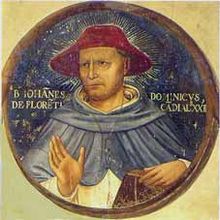- Giovanni Dominici
-
Giovanni Dominici 
Personal details Born 1356
FlorenceDied July 10, 1419 (aged 63)
BudaGiovanni Dominici (1356 – 10 June 1419[1]) was an Italian Cardinal, statesman and writer. His ideas were a profound influence on the art of Fra Angelico.
Contents
Life
Dominici was born in Florence.
He entered the Dominican Order at Santa Maria Novella in 1372 after having been cured, through the intercession of St. Catherine of Siena, of an impediment of speech for which he had been refused admission to the order two years before. On his return from Paris, where he completed his theological studies, he was professor and preacher for twelve years at Venice.
With the sanction of the master general, Raymond of Capua, he established convents of strict observance of his order at Venice (1394) and Fiesole (1406), and founded the convent of Corpus Domini at Venice for the Dominican Nuns of the Strict Observance; a contemporary account of his life is found in the chronicle and necrology of that convent by Bartolomea Riccoboni[2]. He was sent as envoy of Venice to the conclave of 1406 in which Pope Gregory XII was elected; the following year the pope, whose confessor and counsellor he was, appointed him Archbishop of Ragusa, created him cardinal in 1408 and sent him as ambassador to Hungary, to secure the adhesion of Sigismund to the pope.
At the Council of Constance Dominici read the voluntary resignation which Gregory XII had adopted, on his advice, as the surest means of ending the schism. Pope Martin V appointed him papal legate to Bohemia on 19 July 1418, but he accomplished little with the followers of John Hus, owing to the supineness of Wenceslaus IV.
Dominici died at Buda in 1419. He was beatified by Pope Gregory XVI in 1832 and his feast is observed on 10 June.
Works
Dominici was not only a prolific writer on spiritual subjects but also a graceful poet, as his many vernacular hymns, or Laudi, show. His Regola del governo di cura familiare, written between 1400 and 1405, is a pedagogical work which treats, in four books, of the faculties of the soul, the powers and senses of the body, the uses of earthly goods, and the education of children. .
His Lucula Noctis, in reply to a letter of Nicola di Piero Salutati, is the most important treatise of that day on the study of the pagan authors. Dominici did not completely condemn classical studies. He did however express very strong criticism of some humanist tendencies, such as the use of rhetoric in politics and the rise of the professional politician.
Notes
- ^ Catholic Encyclopedia; however this erroneously gives his date of death as 10 July 1420.
- ^ Christian Bratu (2010). "Riccoboni, Bartolomea". In Graeme Dunphy. Encyclopedia of the Medieval Chronicle. Leiden: Brill. pp. 1274-1275. ISBN 90 04 18464 3.
References
 "Bl. Giovanni Dominici". Catholic Encyclopedia. New York: Robert Appleton Company. 1913.
"Bl. Giovanni Dominici". Catholic Encyclopedia. New York: Robert Appleton Company. 1913.- "Political Views in the Preaching of Giovanni Dominici in Renaissance Florence, 1400-1406" by Nirit Ben-Aryeh Debby, Renaissance Quarterly, Vol. 55, Number 1
- Encyclopedia Britannica article on Fra Angelico
- Attribution
 This article incorporates text from a publication now in the public domain: Herbermann, Charles, ed (1913). "Bl. Giovanni Dominici". Catholic Encyclopedia. Robert Appleton Company.Categories:
This article incorporates text from a publication now in the public domain: Herbermann, Charles, ed (1913). "Bl. Giovanni Dominici". Catholic Encyclopedia. Robert Appleton Company.Categories:- 1356 births
- 1419 deaths
- People from Florence
- Italian cardinals
- Italian Roman Catholics
- Beatified people
- Members of the Dominican Order
- 15th-century venerated Christians
- Major Penitentiaries of the Apostolic Penitentiary
Wikimedia Foundation. 2010.
